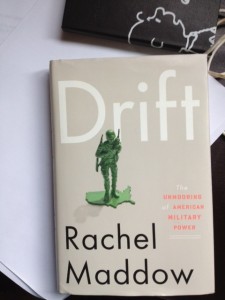 Again and again as I’ve come across some fact or story that befuddles me, I’ve thought: I need Rachel Maddow to explain this to me.
Again and again as I’ve come across some fact or story that befuddles me, I’ve thought: I need Rachel Maddow to explain this to me.
Again and again, her ability to build context through anecdote, to invoke emotion without blurring logic, to raise the issues that matter through the muddle that don’t inspires me to attempt to remain sane. And her first book—Drift: The Unmooring of American Military Power—Maddow projects her always fresh insight into one of the most complex, troubling issues of our time: the creep of permanent war.
The pleasure of reading this book, which is always stimulating and occasionally hilarious, is completely at odds with the disturbing narrative it crafts.
The central thesis is that the drift to permanent war has been bi-partisan. In many ways, it’s a reaction to the insane way we waged the Vietnam War. We learn how LBJ—who in so many ways is a hero—was determined not to call up the National Guard to fight North Vietnamese for fear of completely losing public support. The ultimate rejection of that war and collapse of its mission led to a Congress determined to create hurdles to new wars.
Maddow details how the the War Powers Act and other complications of the Founders vision of waging war only through Congressional fiat have led to unintended consequences, including a small volunteer army made up of mostly poor youths bearing the burden of war for all Americans and the incredibly profitable privatization of military functions.
Maddow tours you through the missile gap, the Reagan Administration’s comic invasion of Grenada and military-industrial complex’s subtle integration into war making during the 90s.
The narrative concludes up ruminating on the trillions we’ve spent on nuclear weapons and the trillions more we’ll spend to keep this incredibly expensive, dangerous and aging arsenal of mutually assured destruction. Maddow’s distance and precision in this chapter is reminiscent of Errol Morris’ Fog of War for its dark humor and galling revelations.
The book ends with a to-do list that would be difficult to imagine even conservatives arguing against (except Maddow’s antipathy toward privatization that forces you to ask a question conservatives hate: when has privatization ever improved anything in America? Certainly not prisons.)
By taking on an issue that challenges all Americans to question their own ideological beliefs, Maddow had found a lane to make to ask a question that could reset American political discourse. If we truly honor the commitment and sacrifice of our military and veterans, we have to ask: Are you okay with endless war?
Since I finished the book, I’ve been ruminating on the idea that it could spur a single-issue movement reminiscent of the National Rifle Association.
Maybe it’s called the National Veterans Association—where veterans and the those who support them honor the service of the few who serve now by enforcing one huge policy idea in a bipartisan way:
Going to war, being at war, should be painful for the entire country, from the start.
Join me in reading Chris Mooney’s The Republican Brain next.



